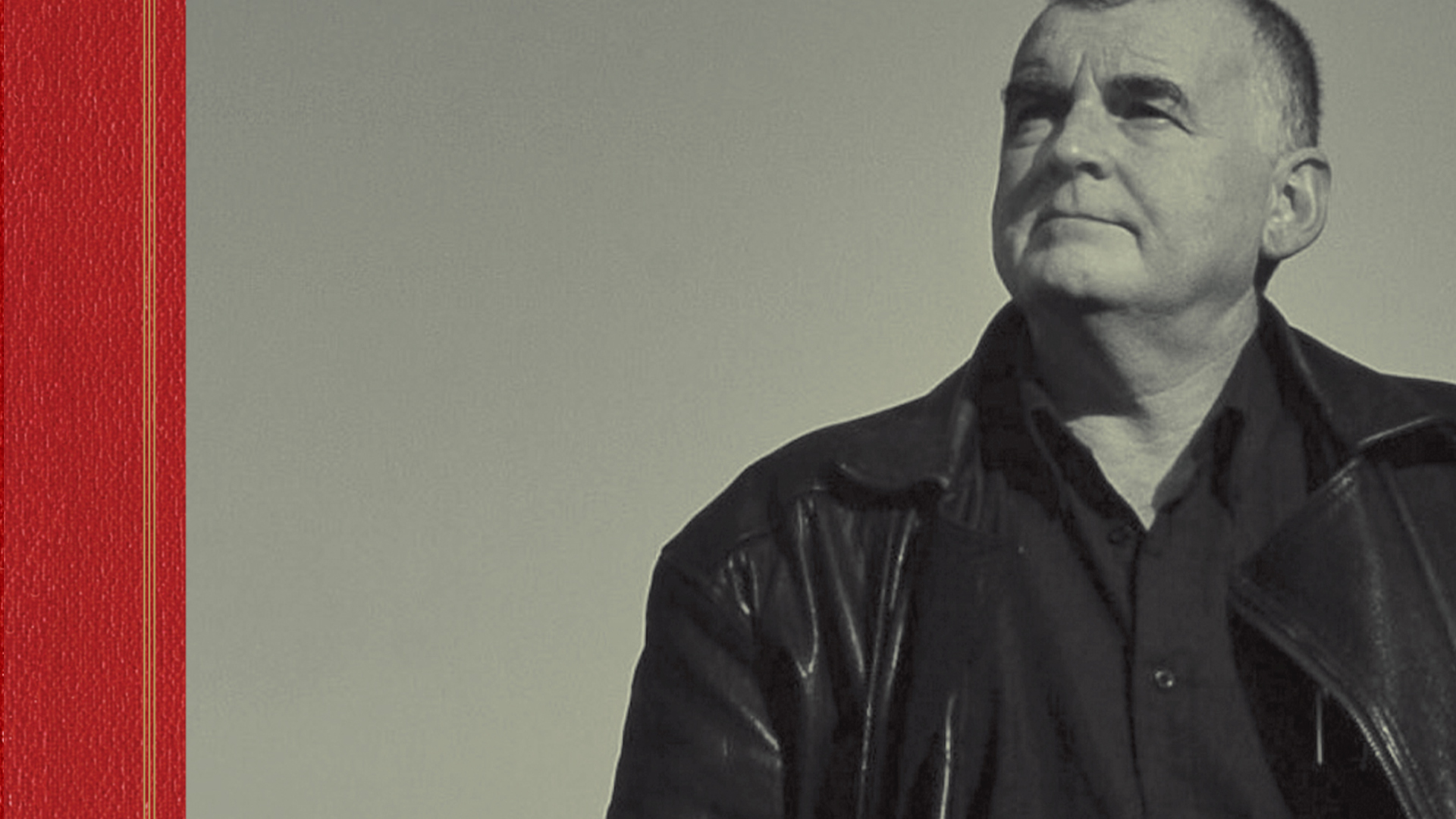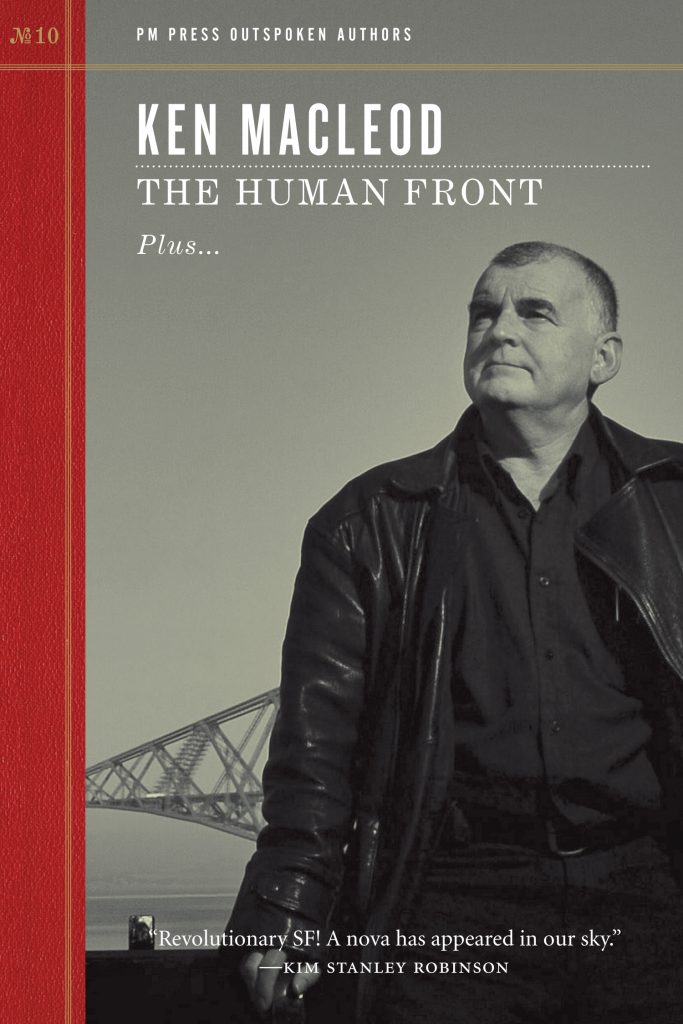by Russell Letson
Locus
July 2013
Ken MacLeod’s Sidewise Award-winning novella The Human Front first appeared as a PS Publishing singleton in 2001, and now is the centerpiece of one of Terry Bisson’s Outspoken Authors series from PM Press. There’s a ‘‘Plus …’’ on the cover and title page, indicating the inclusion of a pair of reflective essays by the author, an interview conducted by Bisson, and an extensive bibliography of MacLeod’s fiction and non-fiction. The elements of the package interact nicely.
The MacLeod I first encountered through the Fall Revolution novels was wild and woolly and quite emphatically Out There, all exotic tech and wide-open-galaxy settings and gnarly post-human action. And, to be sure, politics. Lots of politics. The Human Front comes from the end of that period, but has a rather different atmosphere, an almost claustrophobic variation on the UK of the post-WWII decade, with its class tensions and barriers, shabby-genteel-to-industrial-grimy economy, and straitened emotional horizons – except it’s set in the 1960s and after. But the politics are still right in the foreground. This is an alternate history in which the Cold War was short-circuited in the late 1940s and by 1963 Stalin has ended up as a guerrilla leader (a dead one, in the story’s first lines) in a grindingly permanent international conflict that pits the Allies, now the old imperialist order, against Communist revolutionaries all over the world. The frame of the story is a bildungsroman, the memoir of John Matheson, a middle-class doctor’s son and eventual Communist partisan fighter, who at an early age sees something strange at the crash-landing of an American bomber of the type that proved a military and geopolitical game-changer by dropping an A-bomb on Moscow in 1949. As exotic as the saucer-shaped aircraft is, it is nothing compared to the four-fingered, child- or midget-size pilot whose leg Dr. Matheson sets, and whose very existence, the ‘‘two men in black suits, who weren’t ministers’’ suggest very strongly to the doctor, is to remain a state secret if he knows what’s good for him and his family.
That puzzle remains hanging over the mantelpiece for a long time while young John’s political involvement in radical left causes takes him ever deeper into the asymmetrical war against the old order, culminating in an action that brings him into contact with another Allied saucer craft and its differently-but-equally unexpected pilot. Then things open out considerably, though not quite in the expansive, space-operatic manner of the Fall Revolution novels, or Learning the World, or Newton’s Wake. Instead, we get a tour through at least one more genre familiar enough that John writes that its ‘‘tedious details… need not be repeated here.’’ Then things open out yet again and we end up in somewhat more familiar MacLeodian territory.
It’s hard to comment on the novella without unleashing a spoiler of some kind, but since the story is more than a decade old, it’s worth the risk. The story’s resolution – and the solution to the problems addressed by all the various modern political-economic-technological complexes at work in this world and others – is provided not by John Matheson and his comrades, nor by any forces in his world, but by intervention from outside – in this case, by descendants of the few survivors of the old historical-evolutionary meatgrinder, operating across multiple universes of possibility. The deployment of alternative futures, not just here but across MacLeod’s fiction, is telling – it seems to me to be a severely constrained optimism-in-principle, with no guarantee of success in practice: not ‘‘we could try X’’ so much as ‘‘we could have tried X – but we didn’t and probably won’t.’’ On the other hand, maybe somebody, somewhere or somewhen, will, and here’s how it might play out in some luckier or smarter scheme of things. There is nothing inevitable about progress. In the interview, MacLeod says, ‘‘To this day, British SF writers see evolution as a vast pitiless process that will eventually doom humanity, and US SF writers tend to see it as a chirpy homily to self-reliance.’’ Most of the results of evolution’s experiments, after all, are dead ends. (Compare Greg Egan’s view of evolution in Teranesia.)
The two essays, ‘‘Other Deviations: The Human Front Exposed’’ and ‘‘The Future Will Happen Here, Too’’, explore the genesis of the novella, the former outlining the geopolitical side (‘‘the world becomes Vietnam’’), and the latter the more personal. Perhaps perversely, it is the latter I find more compelling. Even before I read these pieces, I was struck by how strongly the geography, climate, culture, and politics of Scotland seem to have soaked into his fiction, and in ‘‘The Future’’ MacLeod acknowledges his uses of particular places, not just because he knows their textures well but because
Scotland’s streets and mountains, lochs and rain have shaped my own mind just as geological processes have carved the landscape itself. This place I live in is still the place I visit in dreams. I owe it that forming, that weathering, that uplift.
That lyrical note is as important to MacLeod’s voice as the speculative or dialectical or smart-assical, and it explains much of why I return to his work so enthusiastically.







